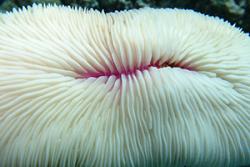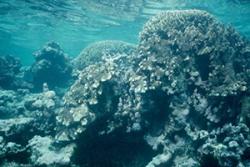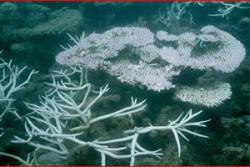Recent advances in understanding coral resilience to rising sea surface temperatures are an essential component of global efforts to safeguard coral reefs
A review of the literature points to the importance of reducing global carbon dioxide emissions in addition to protecting or augmenting resilience mechanisms in the face of increased frequency of climate change impacts.
 A bleached coral at Palmyra atoll.: Image credit: Gareth J WilliamsCoral reefs are under threat on multiple fronts, due to the effects of climate change, with the latest predictions suggesting that βcoral bleachingβ events (when corals lose the symbiotic algae they need for energy production), are already happening so frequently that it will be increasingly difficult for corals to recover.
A bleached coral at Palmyra atoll.: Image credit: Gareth J WilliamsCoral reefs are under threat on multiple fronts, due to the effects of climate change, with the latest predictions suggesting that βcoral bleachingβ events (when corals lose the symbiotic algae they need for energy production), are already happening so frequently that it will be increasingly difficult for corals to recover.
Scientists have been intensively studying how coral reefs respond to environmental stress since the first major coral bleaching events of the early 1980s. It is now clear that rising sea surface temperatures as a result of global climate change are responsible for increasingly frequent coral bleaching events, and that rapid reduction of global carbon dioxide emissions is essential to conserve coral reefs into the future.
Scientists are also turning their attention to studying how resilient some corals may be to the threats posed to them by climate change effects, and how quickly they can recover. Traditionally, scientists have been studying recovery in terms of decadesβbut climate projections suggest that, on average, severe coral bleaching will become a yearly occurrence by mid-century under βbusiness as usualβ and for some reefs this will be far sooner.
Scientists at the School of Ocean Sciences ΒιΆΉΝψ have completed a comprehensive review of the literature on the mechanisms of potential coral resistance and recovery across scales from global reef areas to the microbial level within individual corals.
 A near-shore coral reef which has 'bleached'.: Image credit: John TurnerWriting in , they conclude that, the most urgent course of action is to reduce global greenhouse gas emissions, but concurrently there is also a need to consider novel management techniques and previously over-looked reef areas for protective actions under predicted climate change impacts.
A near-shore coral reef which has 'bleached'.: Image credit: John TurnerWriting in , they conclude that, the most urgent course of action is to reduce global greenhouse gas emissions, but concurrently there is also a need to consider novel management techniques and previously over-looked reef areas for protective actions under predicted climate change impacts.
Dr Ronan Roche, lead author of the paper explained:
βResearch has identified variation in how reefs and corals are affected by thermal stress events in different locations. The task we set ourselves was a synthesis of all the new findings so that coral scientists, conservationists and policy makers could get a really good over-view of what research areas are most promising as global climate continues to change.
For instance, corals, growing in turbid, βmuddyβ near-shore locations, often close to large human populations, have previously considered to be degraded, but have now also been shown to withstand levels of heat which cause coral bleaching elsewhere.
We may also need to accept altered coral reefs in the future, as different types of coral show differing levels of resilience. For example, larger βbrainβ corals tend to be more resilient than  'Finger' corals are more susceptible to 'bleaching' but can grow back quickly.: Image credit John Turnerbranching βfingerβ corals, but if they survive or re-populate a reef, are also slowerβgrowing than other coral types.
'Finger' corals are more susceptible to 'bleaching' but can grow back quickly.: Image credit John Turnerbranching βfingerβ corals, but if they survive or re-populate a reef, are also slowerβgrowing than other coral types.
At the microbial level, scientists have identified different resilience rates among the micro-organisms which live symbiotically within corals. Some are more resilient to increased temperatures and might be able to survive and compete under higher future temperatures. Not all reefs have these strains of symbiotic micro-organisms, so scientists are increasingly trying to work out methods of bio engineering to assist corals in survival and recovery.
Our review of the work done so far reveals a highly complex picture, but thereβs no doubt that reefs are under very real threat. Co-author Professor John Turner leads work in the remote Chagos Archipelago of the Indian Ocean, and Dr Gareth Williams on remote reefs of the Pacific, and even these reefs have suffered the effects of bleaching mortality due to climate change, and are being used as reference sites because of the lack local human impacts. However, most reefs are close to human populations and millions of people depend on them. Coral reefs are a critical habitat, providing food, an economic resource, livelihoods and protection from storms and sea-level rise.β
Publication date: 22 January 2018
